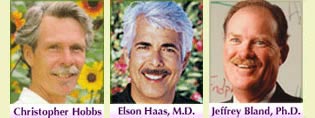Best Herbs for Body Detoxification & Cleansing
A list of the best herbs for the elimination of toxins and for reducing cleansing reaction symptoms that result from a body detoxification program.
Blood Cleansers
Echinacea
Red clover
Dandelion
Burdock
Yellow dock
Oregon grape root
Garlic
Diuretics
Parsley
Yarrow
Cleavers
Horsetail
Corn silk
Uva ursi
Juniper berries
Antibiotics
Garlic
Myrrh
Prickly ash
Wormwood
Echinacea
Propolis
Clove
Eucalyptus
Laxatives/Colon Cleansers
Cascara sagrada
Buckthorn
Dandelion
Yellow dock
Rhubarb root
Senna leaf
Licorice
Skin Cleansers (Diaphoretics)
Burdock
Oregon grape
Yellow dock
Goldenseal
Boneset
Elder flowers
Peppermint
Cayenne pepper
Ginger root
Anticatarrhals
Echinacea
Boneset
Goldenseal
Hyssop
Garlic
Yarrow
Sage
Herbs for Detoxification
Book Reveiw: Herbs for Detoxification by C. J. Poutinen
Here's a complete list of detox herbs.
In 90 pages, cover-to-cover, C. J. Poutinen offers some of the best advice available on the how-to's of detoxification. The book could be more expansively titled "How Herbs Can Be Part of A Comprehensive Detox Plan" or "Practical Tips on A Detox Plan Using Herbs."
I've read the book twice now and feel I could re-read it three or four more times because it is jam-packed with the "news you can use" in the detox department. The first page summary of the contents calls it "an invaluable guide for strengthening the immune system, improving health and coping with the environmental stresses vitamin supplements, vitamins, supplements, herbs, herbal remedies, herbs for detox, detox herbs, minerals, natural herbs, detox, how to detox, detox your body, detoxify, detoxification, liver, stress, fatigue, energy, anxiety, weight loss, cleanse, cleansing, toxins, remove toxins, fasting, nutrition, alternative health, raw foodwe all experience." I agree.
As in most books of this genre, Herbs for Detoxification begins with a definition of detoxification and why our exposure to countless environmental toxins makes it so necessary. It proceeds to describe several popular herbal detox therapies, from the Gerson Institute Therapy, Johanna Brandt, Rudolf Breuss, Bernard Jensen, Harry Hoxsey and Rene Caisse, that were originally developed to treat cancer and have proven effective in many other ways.
The approach taken by all of these therapies is that debilitating illnesses are systemic, not local; that they involve the entire body, not just a lung or a knee; and that by clearing the body of toxins that interfere with its ability to heal itself, a juice fast, mono-diet, herbal blend or series of high colonics boosts the immune system and removes the actual cause of disease.
C.J. then introduces an extremely valuable tip for practical detoxing–ph testing. By testing one's saliva first thing in the a.m. with ph paper of a certain calibration, one can determine the degree of alkalinity versus acidity of one's body. Experts seem to agree that an alkaline state is more healthy than an acidic state and is associated with a diet high in fresh fruits and vegetables, complex carbohydrates and low in high fat foods such as meat and dairy products.
The test establishes how much preparation a person needs to do before beginning a more intense detox. The preparation phase for a detox is a detox in and of itself, but is less rapid. Rapid detoxing, such as fasting or herbal kits, can bring on cleansing reactions such as intense headaches,
C.J. then explains why a person would be wise to patiently undergo the pre-detox phase and avoid cleansing reactions as much as possible. These include foul-smelling sweat, urine and fecal matter, a fuzzy tongue, bad breath, acne, rashes or other eruptions, racing pulse, headaches, weakness, dizziness, fatigue, insomnia, nausea, sinus congestion and the intensification of previously existing conditions. Not everyone would experience all of these symptoms, but it's almost certain that unless your body is in the correct alkaline range, as shown by the ph testing, you will experience some of them unless you take a slow and steady approach to detoxification.
"Dramatic cleansing reactions, although some people swear by them, are not necessarily desirable, for in the case of serious illness or exposure to toxic chemicals, the liver and other organs of detoxification and elimination are overworked. In extreme cases, sudden detoxification can be fatal. People who are young, healthy, active, health-conscious, well-nourished and free from major toxins can embark on the most arduous cleansing programs with good results and few side effects, but for most of us, ambitious programs are best approached with caution and common sense. Severe cleansing reactions can be incapacitating and truly painful. It isn't necessary for most people to suffer in order to rid their bodies of stored toxins, and the unpleasant side effects of detoxification can be minimized, even in those who have seriously toxic conditions." (Pg. 38)
C. J. offers an excellent series of self-administered techniques for reducing cleansing reaction symptoms and continuing to eliminate toxins at the same time. This is one of the ways in which her book is so valuable. She also mentions who should not undergo detoxification without the assistance of an experienced healthcare professional. This includes the very young, the elderly, the chronically ill and anyone who suffers from a serious disease, is addicted to drugs or alcohol or who has been exposed to dangerous chemicals, heavy metals or radioactive material.
The other way in which this book stands out is, as the title describes, in its descriptions of Herbs for Detoxification. C.J. narrows down the dizzying array of choices in herbs and herbal preparations to just enough to grow into in the first year or so of detoxing.
